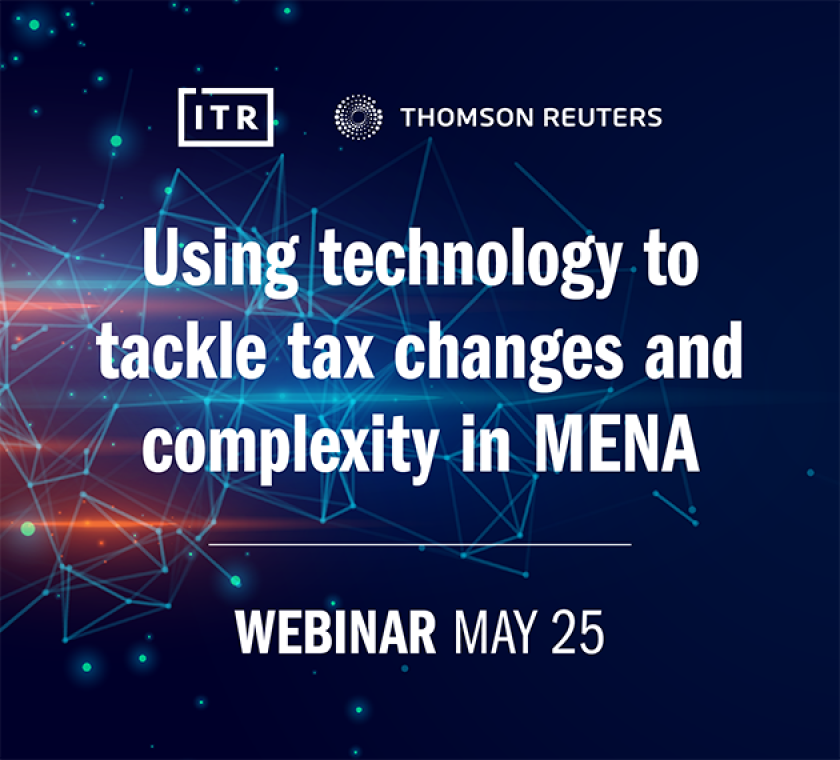Register here for ITR’s webinar on using technology to tackle tax challenges and complexity in MENA
In association with Thomson Reuters, the live webinar will take place on May 25 at 11am BST / 2pm GST.
We will cover:
The evolution of tax in the GCC and globally
Tax policy is changing at a very fast pace. As governments and tax authorities across the Gulf Cooperation Council (GCC) region increase tax rates and introduce new measures to enhance tax compliance and transparency, tax departments have a host of new challenges to navigate.
Some of these include:
E-invoicing: Saudi Arabia has already introduced Phase 1 of its e-invoicing regime, with Phase 2 coming soon. There is a possibility that the United Arab Emirates (UAE) will be the next country to introduce e-invoicing. Tax compliance is becoming more complex as tax authorities increasingly demand digital reporting.
Corporate income tax: Saudi Arabia, the UAE, Qatar, Bahrain, and Oman signed the OECD’s global tax agreement for a 15% minimum income tax rate for multinationals. This means many large companies will need to prepare for new corporate income tax regulations going forward.
VAT: Organisations in Kuwait and Qatar are bracing themselves for the imminent introduction of VAT. Kuwait’s government is currently drafting its VAT law, and Qatar is expected to announce its VAT law and Executive Regulation during 2022.
How these developments impact tax teams
These changes are increasing the burden of compliance on taxpayers. With the steady digital transformation of the tax system, companies will need to examine the resources they are using to manage VAT, and ask whether these will be capable of supporting e-invoicing and other new digital requirements.
We will discuss how tax teams can continue to ensure accurate and on-time compliance, while staying ahead of changing regulations.
Is it time to rethink traditional approaches?
Although tax transformation has been a reality in MENA for a few years now, a number of corporations, banks, and financial institutions are yet to bring their technology strategies in line with modern tax demands. These companies run the risk of tax authorities outpacing them with regard to tax systems and processes.
Perhaps now is the opportune time to adopt indirect tax technology, rather than continuing to rely on a patchwork of legacy systems or manual processes - methods that have proven to be ineffective in ensuring tax accuracy and handling large volumes of transactions?
How tax technology helps tax teams
Indirect tax technology increases accuracy and compliance through automation, up-to-date content, and comprehensive data management.
The webinar will explore how this approach allows tax departments to manage increasing complexity more efficiently in-house.

Ramy Rayan
Head of consulting, VAT, MENA
Thomson Reuters
Ramy Rayan is head of the consulting group for VAT at Thomson Reuters for the Middle East and North Africa region, based in Dubai and has been working closely with corporations, governments, accounting firms and financial institutions in the GCC for their VAT readiness and implementation.
Ramy has more than 11 years of experience in ERP Solutions, Database Management, Business Process and has worked with multi-disciplinary teams of technical, key users & outsourced consultants.
Ramy holds a bachelor’s degree (BSc) in Information Systems from the Arab Academy for Science, Technology and Maritime Transport (Egypt) and is an avid technology enthusiast. He is hands-on and enjoys working on complex projects, combining his broad technical skill set and knowledge to implement solutions which work best for his clients.











